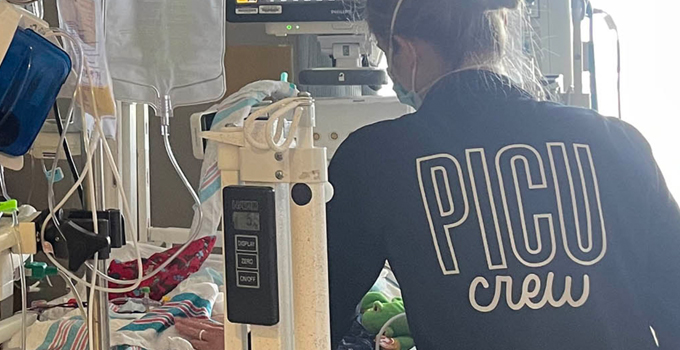The images of pediatric ICUs in New Mexico full of babies fighting respiratory illnesses last fall are hard to forget—especially for parents. A spike in respiratory illnesses like respiratory syncytial virus (RSV) forced the New Mexico Department of Health to issue a public health emergency as the surge put an immense strain on hospitals across the state.
This week, there was some promising news on that front as the U.S. Food and Drug Administration (FDA) approved the drug Beyfortus (nirsevimab-alip) for the prevention of RSV in infants born during or entering their first RSV season and for children up to two years of age who are more susceptible to severe cases of the virus.
“It’s really exciting,” said Anna Duran, MD, associate chief medical officer of the UNM Children’s Hospital. “Seasonally, children's hospitals across the nation are hit with a respiratory surge. During that time, there are a large number of children who will visit emergency departments, urgent care clinics, and their doctor’s offices. A large number of them will require hospitalization.”
Duran says while RSV is very common, with nearly everyone being exposed by the time they are two years old, infants under one year of age have the highest risk of developing severe symptoms.
“RSV moves into the smallest part of a baby’s airway,” Duran said. “Those airways are super, super tiny. When those tiny airways get clogged with mucus and viral particles, babies have difficulty breathing. Parents will notice their child breathes faster and will work harder to breathe; over time this can worsen to the point that they may need hospitalization.”
Duran says prior to the FDA approval of Beyfortus this week, they only had one other immunization option, but it’s not approved for all babies. “The drug Synagis also helps prevent RSV, but it's only used for infants with severe prematurity or children with certain chronic illnesses. So, it leaves out all other healthy babies who will still get RSV.”
According to the FDA, in studies, Beyfortus reduced the risk of RSV infection between 70% and 75% among infants and children 2 and younger.

This is really promising. It could change what our hospitals face each RSV season.
For parents with children older than two years old, Duran says RSV will typically present itself like a normal cold and can usually be treated with over-the-counter medication. However, Duran says children older than two can still be hospitalized with RSV so it’s important that parents know when to bring their child to the emergency room.
“When they see their child child's struggling to breathe,” Duran said. “If they're working hard to breathe, and they're breathing fast, that’s really the time to think about coming in.”
New Mexico’s RSV season typically starts in late October, with its peak hitting in December. There is no firm date on when Beyfortus will be released to the public, The U.S. Centers for Disease Control and Prevention (CDC) is holding an advisory committee meeting on August 3rd to discuss how the new drug should be used.
Visit the CDC website for more information on RSV including signs and symptoms.
